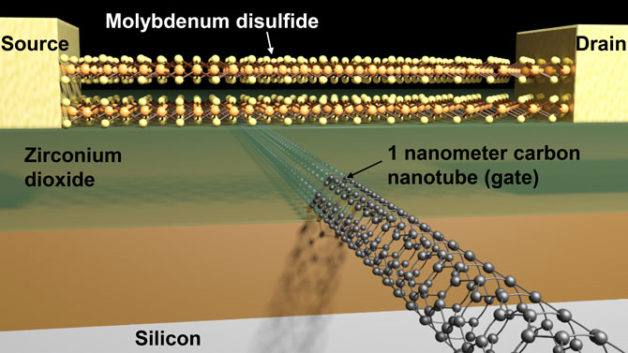Above, the Lawrence Berkeley National Laboratory
A Human Hair is 50,000 Times Thicker Than New Transistor

Schematic of a transistor with a molybdenum disulfide channel and 1-nanometer carbon nanotube gate. (Credit: Sujay Desai/UC Berkeley)
The Lawrence Berkeley National Laboratory (LBL) has announced that a team in its Electronic Materials Program, within the Materials Science Division, has challenged the laws of physics, to create a working 1-nanometer gate.
[Watch Berkeley lab tour video.]
The transistor law, LBL said, “set a 5-nanometer limit on the size of transistor gates among conventional semiconductors, about one-quarter the size of high-end 20-nanometer-gate transistors now on the market.”
LBL did the law multiples better by using a new set of materials. These include “carbon nanotubes and molybdenum disulfide (MoS2), an engine lubricant commonly sold in auto parts shops.”
The findings were published in the journal, Science. The transistor creators were University of California at Berkeley professor Ali Javey and graduate student Sujay Desai.
The journal entry team also included:

Juan Pablo Llinás – Linkedin
Llinás is a PhD student in Electrical Engineering at the University of California at Berkeley, and a Graduate Student Researcher in the Nanoelectronics and Nanostructures Group.
He received his BS in Electrical Engineering from the University of Illinois at Urbana-Champaign.

Surabhi R. Madhvapathy – Linkedin
Madhvapathy is an undergraduate researcher studying novel semiconductor materials systems and nanoelectronics in the Javey Lab.
Journal Reference:
- Sujay B. Desai, Surabhi R. Madhvapathy, Angada B. Sachid, Juan Pablo Llinas, Qingxiao Wang, Geun Ho Ahn, Gregory Pitner, Moon J. Kim, Jeffrey Bokor, Chenming Hu, H.-S. Philip Wong, Ali Javey. MoS2 transistors with 1-nanometer gate lengths. Science, 2016; 354 (6308): 99-102 DOI: 10.1126/science.aah4698







